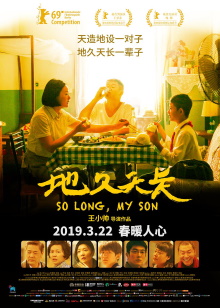
Wang Xiaoshuai is a director of some note in China. It appears that I haven’t watched any of his films before this but his very first film The Days has been on my list for ages as it seems to be impossible to find. That’s why I hoped that this would be decently good but it turned out to be just another sentimental mess, and one that is far too long to boot.
The film recounts the travails of a family across two timelines that are decades apart. In the present, elderly couple Liu Yaojun and Wang Lijun have difficulty controlling their unruly teenage son. Though they call him Xing Xing, it eventually becomes clear that this isn’t his real name and he was adopted. In the past, the couple worked in a factory and were close friends with another family. The real Xing Xing and the son of the other couple Hao Hao were best friends until Xing Xing drowned while the children were playing together at a dam. This tragedy would naturally haunt both families forever and what’s worse is that before it happened the mother Lijun was pregnant with a second child but was pressured to get an abortion by her supervisor who happens to be the mother of Hao Hao in order to comply with China’s one child policy.
On the face of it, this does have all of the ingredients of a good film. With China rescinding its one child policy, now would be a great time to start a conversation about its impact on people and I’ve never heard of a film daring to touch the subject before. But this project ruins it by trying to do far, far too much. The director seemingly can’t help but cram in every possible trope of a story about parents losing their child, resulting in a horrendously long three-hour monster of a film. There’s the personal grief of the parents, the guilt of the other couple, the guilt of Hao Hao and I suppose that’s fair enough. But then there’s also all kinds of extraneous stuff like a subplot involving the sister of the other couple who seems to have a crush on Yaojun and wants to make up her family’s failing; there’s how the film keeps harping on nostalgia and the sense of how much China has changed across the decades; there’s the story of the adopted son and his relationship with his foster parents etc. These separate stories don’t complement one another and only dilute the emotional impact of the drowning that is at the heart of the film.
The director compounds these problems with some rather bad stylistic decisions. Not only does the film liberally jump back and forth in time, but the director deliberately makes these transitions confusing in order to unsettle the audience. This kind of obfuscation makes sense in what I like to call puzzle-box films in which you’re meant to unravel a central mystery. But there shouldn’t be a mystery in this film, it should be about getting the audience to emotionally connect with your characters. Then there’s how the film uses the same song over and over again to milk every last iota of nostalgia out of it. Or how the ringtone on Yaojun’s phone is unnecessarily intrusive and the director for some reason allows it to play out for far too long. I really can’t understand how a director of such renown can have such a poor sense of how to balance these elements.
My wife noted that this film depicts the living conditions of 1980s era China pretty accurately and I’m amused that the film directly lampshades this by having the couple visit their old house in the present as they had left it untouched. But apart from this and the fact that this is one of the few films that even attempt to talk about the one child policy, this is a thoroughly mediocre piece of work. The director should have focused on what he really wanted to say and edited everything down to two hours or less. As it is, this is so long and so annoying that I’d consider it borderline unwatchable.